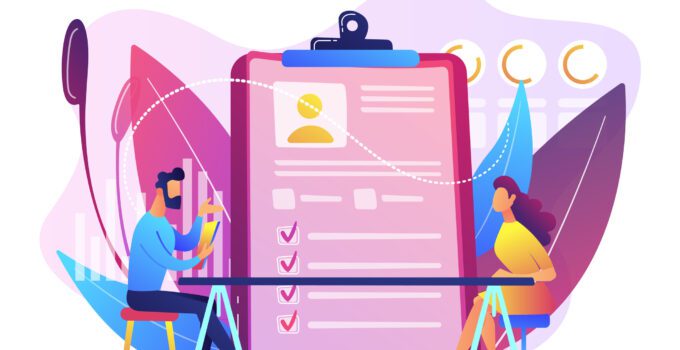There are multiple types of hiring assessments and several reasons why a company might want to employ them in the hiring process. Hiring assessments can be used to test an applicant’s skills, accelerate the hiring process, and increase the quality of interviews. Your reasons for deciding to use assessments as part of your hiring process will affect what type of assessments you use. Assessment types include job knowledge tests, integrity tests, cognitive ability tests, personality tests, emotional intelligence tests, or skills and physical abilities tests. Each type of assessment will provide different information about your candidate; that’s why it is
The hiring process has traditionally adhered to the screening-out mentality. What does this candidate bring to the table that we don’t like? What problems do we anticipate if we hire this person? What are the negatives? However, this type of decision-making is causing us to focus on things that don’t matter as much as we think they do. Eliminating candidates before they get too far in the hiring process is often a missed opportunity. The primary goal of any recruitment process should always be to identify the right person for the job. This is especially true in the current employment
With the age of technology in full swing, opportunities abound for companies to adopt new, modern techniques to help improve their business processes. One such technique, particularly useful in the hiring process, is known as a psychometric-based assessment. Psychometrics refer to a type of test or assessment that analyzes and recognizes patterns of behavior and measurable personality traits. The science of psychometrics integrates the fields of psychology and mathematics to create algorithms that analyze scores. This is particularly helpful when assessing various cognitive and behavioral ability levels. With the help of psychometrics, employers can identify the best candidates for roles
Sarah is a 31-year-old Client Relations VP at an established firm and seeks a Program Manager to implement her service initiatives. A recruiter has sent several candidates with varying degrees of qualification. Today, she’s interviewing Jacob, whose resume closely aligns with the role. When Jacob sits down for the interview, Sarah offhandedly notices that he appears to be in his late 40s. She asks good questions and Jacob provides encouraging responses. However, nagging thoughts start creeping around the back of Sarah’s mind: Jacob might resent having to take direction from someone 15 years younger than him. He may push back,
Measure your way to success with Talassure Assessments, delivering insights that improve workforce performance. Could your organization improve in any of the following areas? Workforce engagement Job matching Talent retention Leadership development Sales performance Team Effectiveness Employee morale If your answer is yes, now is the time to explore new solutions for managing your most important resource: your people. Today’s workforce has outgrown yesterday’s management practices. Engagement, fulfillment, opportunities for growth. Far more than “nice to have” advantages, these concepts are held in high regard by today’s professionals and in fact are the primary reason talented people choose to work
1. Understand Their Perspective Who are you working with? While it may be impossible to truly understand another person’s unique perspective, it’s important to try. Getting to know your client is a key part of being able to effectively coach them. Find out about their personal and professional background, including their goals and any perceived hindrances to reaching them. The more you can know your client, the more you can understand their perspective, making you better able to tailor coaching for their specific needs. 2. Listen and Empower Check-in frequently. Professional coaching is all about relationships, and relationships flourish when
Managing people is one of the most difficult aspects of being a leader. With great power comes great responsibility. Are you missing ways to make your life easier and your employees happier? Follow these 10 tips and never worry about being a mediocre boss again. 1. Get to Know Your Employees Understanding your employees’ unique strengths, gifts, skills and personalities, and keeping them in mind, can make you a better manager. Whether managing a small team or hundreds of employees, understanding what each of them brings to the table will make a difference. Knowing your employees better helps direct
Simplicity! That’s what everyone promises in our tech-driven world, isn’t it? But it turns out that simplicity can be complicated. Consider hiring assessments. There are lots of them on the market, and most are presented as being simple and easy. After all, what hiring manager or HR professional wants to jump through hoops to get answers or read pages and pages of dense information about job candidates when the position needs to be filled ASAP? Leaders need timely intel that supports good decisions so they can make the hire and move on to the next business challenge. But choosing the
It’s no secret that numerous aspects can affect your overall workplace performance. But there are factors that often get overlooked or ignored completely. We’re going to explain one of them—why it is important, and how you can utilize it to maximize your performance in the workplace. The first is something that psychologists call flow state. In this state, a person may be so involved in an activity that nothing else can distract them or shift their focus; the experience is so enjoyable or attention-grabbing that the person continues the task for the sheer sake of doing it. It is said
Performance appraisals are a useful and necessary tool for maintaining a prosperous workforce. Completing this process incorrectly, however, can be just as detrimental as not attempting one at all. It’s important to be aware of the common errors made during the performance appraisal process and how assessments can help so you can avoid falling victim to those same errors. Halo Effect/ Single Deficiency Bias An evaluator may be so focused on one positive characteristic or trait that they incorrectly judge a person’s performance to be higher than it actually is—this is called the halo effect. On the other hand,










